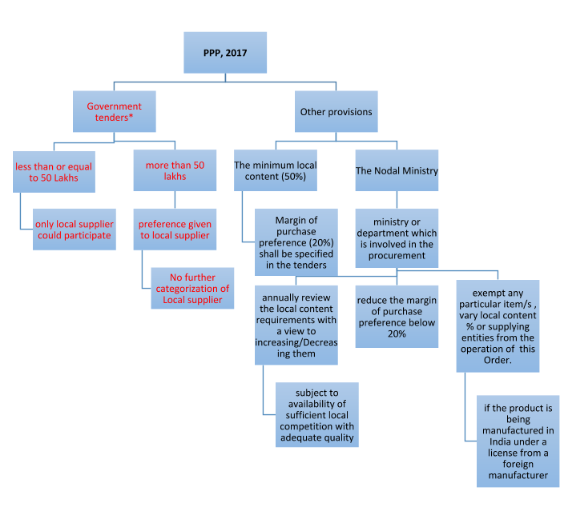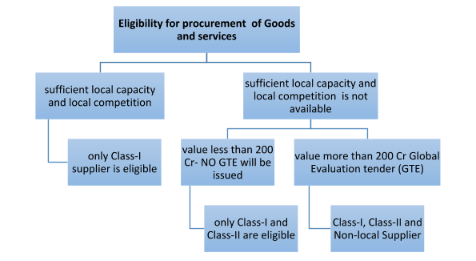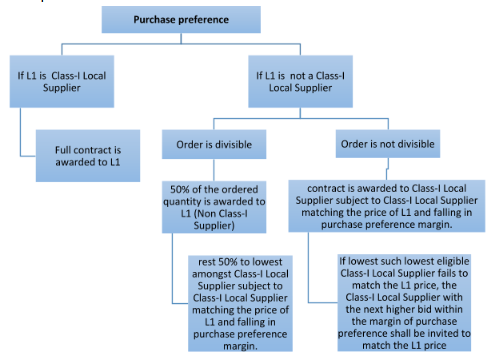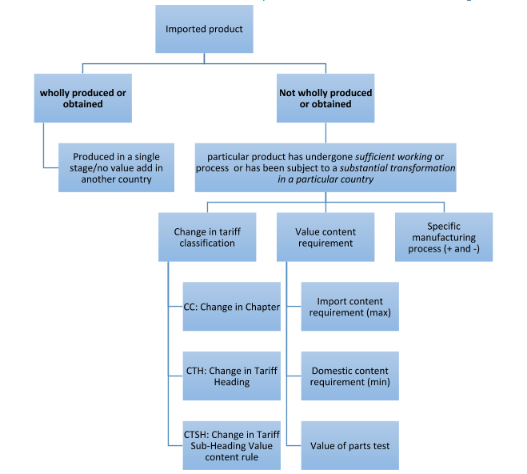This article has been written by Medha Chhabra and Richa Agrawal.
Table of Contents
Background
The Government of India has recently come out with notifications with respect to maintaining the relationship and regulating the procurement of goods and services from foreign countries.
This article primarily focuses on following recently released notifications which (either directly or indirectly) would influence India’s trade relationship with other countries: –
- Revisions in the Public Procurement Policy (Make In India);
- Amendment of eligibility criteria for participation in government tenders under General Financial Rules, 2017;
- Customs (Administration of Rules of Origin under Trade Agreements) Rules, 2020
- Amendment to FDI Policy; and
- Other notifications
Revision in the Public Procurement (Preference for MII) Order 2017
Background
To encourage ‘Make in India’ and promote indigenous manufacturing and production of goods and services through partnerships, cooperation with local companies, establishing production units in India or Joint Ventures (JV) with Indian suppliers, Government of India promulgated Public Procurement (Preference to Make in India), Order 2017 on 15 June 2017 (PPP).
In Order to understand the amendments, it is important to understand the key features of PPP, 2017:

*(Same has been amended in the PPP, 2020)
Revised PPP Order 2017
As a part of “Atmanirbhar Bharat Abhiyan”, DPIIT has promulgated a revised PPP Order 2017 on 04 June 2020.
The following amendments have been made:
- Classification of Suppliers
- Class-I Local Supplier: A supplier or service provider, whose goods, services or works offered for procurement, has local content equal to or more than 50%, as defined under this Order.
- Class-II Local Supplier: A supplier or service provider, whose goods, services or works offered for procurement, has local content more than 20% but less than 50%, as defined under this Order.
- Non-Local Supplier: A supplier or service provider, whose goods, services or works offered for procurement has local content less than or equal to 20%, as defined under this Order.
Eligibility

Purchase preference

Local content
- It is the amount of value-added in a product/service in India.
- Local content = total value of the item procured-net domestic indirect taxes – (the value of imported content in the item + all customs duties).
- Local Content can be increased through partnerships, cooperation with local companies, establishing production units in India or Joint Ventures (JV) with Indian Suppliers and by increasing the participation of local employees in services and by training them.
- The Class-I and Class-II Local Suppliers shall, at the time of tender, bidding or solicitation, be required to indicate the percentage of local content and provide self-certification that the item offered meets the local content requirements.
- In cases of procurement for a value in excess of INR 10 Crores, the Class-I and Class-II Local Suppliers shall be required to provide a certificate from the statutory auditors of the company giving the percentage of local content.
- Local content is calculated and verified for each item and not on organization or business basis.
- Nodal Authority can conduct random audits to verify these certifications.
- While registering the item to be displayed on GeM, to the extent possible, specifically mark the items that meet the local content requirement.
- Calculation of local content:
|
A. |
COST COMPONENT (Rs./US$) |
Cost Summary |
||||
|
Domestic |
Imported Rs./US$ |
Total |
LC |
|||
|
% |
Rs./US$ |
|||||
|
b |
c |
d |
e = b/d |
f = d X e |
||
|
I |
GOODS |
|||||
|
1. |
Material used cost |
|||||
|
2. |
Equipment cost |
|||||
|
3. |
Sub Total I |
|||||
|
II |
SERVICES |
|||||
|
1. |
Personnel & Consultant Cost |
|||||
|
2. |
Equipment & Work Facility Cost |
|||||
|
3. |
Construction / Fabrication Cost |
|||||
|
4. |
Other Services Cost etc. |
|||||
|
5. |
Sub Total II |
|||||
|
III |
TOTAL COST GOODS + SERVICES |
|||||
|
B. |
Non Cost Component |
|||||
|
C. |
TOTAL QUOTED PRICE |
|||||
Note:
% LC Combination =
[{Total domestic component cost of goods (A. I. 3. b) + Total domestic component cost of service (A. II. 5. b)} / Total Cost (A. III. d)] X 100Impact of this regulation
- Bidders are required to maintain Local content of greater than 50% as certain tenders are only reserved for Class-I category.
- Class-I Local Suppliers (More than 50% local content) will be given price preference over L1- other suppliers (Class II and Non-local).
- For certain products, local content is categorically specified by nodal authorities which should be maintained in order to participate in the tender for that particular product.
- Procurement of raw material and services locally would enhance local content.
- Procurement of raw materials and services from following shall not be considered as local content: –
-
- a foreign company;
- a subsidiary of a foreign company
- Certification of local content to be provided with each tender.
- The nodal ministry has the power to exempt certain items from the local content requirement if the technology for the manufacture of same is owned by a foreign bidder and same is transferred to India through license or technology transfer arrangement.
- “Technology” licensed from a foreign company or a foreign company which is wholly owned subsidiary of an Indian company shall not be treated as local content.
- PPP is though applicable to govt tenders, it could have a flow-down effect e.g. a client (private entity) may insist on maintaining local content in the products/services provided by us in order to maintain his local content for participating in a govt tender for the same product.
- In PPP tenders, while procuring raw material, components or services from sub-supplier, we are required to have a certification of local content from sub-supplier. This is a flow-down requirement and even sub-suppliers are required to follow the same with his supply chain.
Amendment of eligibility criteria for participation in government tenders under General Financial Rules, 2017
Introduction
- General Financial Rules, 2017 (GFRs) are a compilation of rules and orders of the Government of India to be followed by all while dealing with matters involving public finances. It is applicable to all the government and autonomous departments. The departments are bound to follow the proper procedure as laid down in GFRs while procuring goods and services while using public funds.
- Rule 144 Fundamental principles of public buying (for all procurements including procurement of works) – The authorities delegated with the financial powers to procure goods in the public interest shall always bring in efficiency, economy and transparency in the process and conform to the yardsticks as laid down in this Rule.
Applicability
- By this notification, the government has imposed a restriction on participation in tenders (for any procurement whether of goods, services (including consultancy services and non-consultancy services) or works (including turnkey projects)) on bidder:
- from countries which share a land border with India;
- whose beneficial owner resides in countries which share a land border with India;
- a subsidiary of a company/an entity substantially controlled by an entity/an entity whose beneficial owner, is situated in a country which shares a land border with India.
- The restriction is not absolute. Parties (the bidder) from countries which share a land border with India shall be allowed to participate in tenders only if the bidder is registered with a registration committee to be constituted by the Department for Promotion of Industry and Internal Trade (DPIIT).
- Political and security clearance from the Ministries of External and Home Affairs respectively will also be mandatory.
The guidelines are required to be implemented while conducting the following tenders:
- Government Ministries & Department
- Autonomous Bodies
- Public Banks and Financial Institutions
- Central Public Sector
- Public-Private Projects receiving funds from Government
- Union Territory & National Territory of Delhi or its agencies
- Private organisations/Companies are exempted
Effective Date
- All tenders issued by parties mentioned above on and after July 23, 2020.
- In respect of tenders already invited, if the first stage of evaluation of qualifications has not been completed, bidders who are not registered under the new Order will be treated as not qualified. If this stage has been crossed, ordinarily the tenders will be cancelled, and the process started de novo.
- Not applicable to tenders already awarded prior to 23rd July 2020.
Implication
- Participation in tenders as a joint tenderer – If an indian party is forming an unincorporated joint venture or a consortium in order to bid in a tender then the consortium partner is required to be mandatorily registered with the competent authority.
- subcontracting – if a tender is awarded to a bidder, bidder is not allowed to sub-contractor the works in same unless registration requirement as mentioned above is fulfilled.
- procurement of goods- bidder is allowed to procure raw materials from outside India (as long as we are not the agent of such company) as the same is not expressly prohibited in the agreement.
- Does not affect Tenders conducted by private parties.
Impact on Indian Companies
- An Indian Entity can participate in the government tenders provided it submits the compliance certificate while bidding for such tender.
- Private companies can conduct tenders and are not required to follow these guidelines while conducting tenders.
- In case an Indian company decides to bid jointly with another party, and if the partner belongs to the countries sharing a land border with India, then such partner will have to comply with the requirements of registration, clearances and certification.
- An Indian entity can procure raw material from outside India and the same would not fall under the purview of this notification. However, it should be noted here that this notification is to be read in conjunction with the Make in India Policy as explained above, hence an Indian entity while participating in government tenders should always maintain the local content as required and specified in the applicable notifications.
- An Indian entity cannot subcontract works contract to a party belonging to a country sharing land borders with India unless such party comply with requirements of registration, clearances and certification.
- Certification – While participating in government tender, the Indian entity will have to submit a certificate, self-certifying compliance of these rules.
- Non-compliance – In the event, any false/wrong information or representation is submitted then the defaulting entity will have to face legal consequences accordingly.
Customs (Administration of Rules of Origin under Trade Agreements) Rules, 2020
|
Provisions |
|
|
Power of customs officers |
|
Customs officers can ask for: –
Concerned officers can deny the claim.
|
Evaluation of country of origin

Amendment to FDI policy
Introduction
The Government of India (“GoI“) had, on April 17, 2020, released Press Note No. 3 (2020 Series) (“Press Note 3“) to amend the Consolidated Foreign Direct Investment Policy of 2017 (“FDI Policy“) with a stated view of curbing opportunistic take-overs/acquisitions of Indian companies.
Press Note 3 comes across as a protectionist measure to save Indian industry from predatory capital, while they struggle to survive the COVID-19 hit economy. It provides that all foreign direct investment (“FDI“) from countries which share a land border with India (“Border Countries“) shall be subject to prior approval from the Government (“Approval Route“). Press Note 3 came into effect on April 22, 2020, the date of publication of the Foreign Exchange Management (Non-Debt Instruments) Amendment Rules, 2020 (“FEMA Notification“).
Key Implications
- Border countries
- While Press Note 3 does not list the Border Countries, India recognises land borders with Nepal, Pakistan, China, Bangladesh, Myanmar, Bhutan.
- Status of Taiwan and Hong Kong are unclear.
- Determination of Beneficial Owner
- Press Note 3 does not define the term ‘beneficial owner’.
- The Prevention of Money Laundering Act, 2002 (“PMLA“) and the RBI (Know Your Customer) Directions, 2016 (“KYC Directions“) prescribe certain criterion for determining a beneficial owner. Notably, the KYC Directions which are issued pursuant to the PMLA, define ‘beneficial owner’ in further detail as one or more persons/entities who hold a certain threshold of stake in the relevant entity and not just any stake in the entity
- No Minimum Threshold
Despite its stated objective of restricting takeovers, Press Note 3 has not prescribed any minimum threshold of investment by Border Investors in order for these to be covered under Approval Route. Therefore, as the position stands now, even a miniscule or passive investment by a Border Investor, as well as any investment by investment funds/ vehicles with beneficial ownership in Border Countries is under Approval Route.
Notifications covered in this article and other important notifications/news articles regulating our trade with foreign countries:
|
Sr. No. |
Regulation |
Date |
Notification |
|
Revisions in the Public Procurement Policy (Make In India) |
June 4, 2020 |
https://dipp.gov.in/sites/default/files/PPP%20MII%20Order%20dated%204th%20June%202020.pdf |
|
| 2. |
Amendment to GFR |
July 23, 2020 |
https://www.doe.gov.in/sites/default/files/OM%20dated%2023.07.2020.pdf |
|
3. |
Customs (Administration of Rules of Origin under Trade Agreements) Rules, 2020 |
September 21,2020 |
|
|
4. |
Amendment to FDI Policy |
April 17,2020 |
|
|
5. |
MOD Negative List |
May 26, 2020 |
https://pib.gov.in/PressReleasePage.aspx?PRID=1625509
|
|
6. |
Restrictions on import of Toys |
Feb 25,2020 (effective date Jan 1, 2021) |
https://bis.gov.in/wp-content/uploads/2020/03/Toy_QC_order.pdf https://dipp.gov.in/sites/default/files/PressRelease-ToysQCO-16September2020.pdf |
|
7. |
Restrictions on import of TV |
July 30,2020 |
|
|
8. |
Ministry of Power – List of products to be procured from the Class I Supplier irrespective of the values of the contract. (mentioned in Annexure I) (attached herein for reference) Items manufactured under license or through technology transfer of intellectual property owned by foreign manufacturers is exempted from local content requirement (mentioned in Annexure II) |
July 28, 2020 |
|
| 9.
|
Ministry of Defence – Amendment to Notification No. 59011/8/2015-D(HAL-II) dated 26.07.2018 specifying the minimum local content percentage for qualifying as a supplier (attached herein for reference) |
July 31, 2020 |
|
|
10. |
Ministry of Defence – Amendment to Notification No. 18 (2)/19/PPO-Notification/DP (Plg-MS) dated 20.02.2020 specifying the minimum local content percentage for qualifying as a supplier (attached herein for reference) |
July 31, 2020 |
|
|
11. |
Ministry of Defence – Amendment to Notification No. 18 (2)/19/PPO-Notification/DP (Plg-MS) dated 21.05.2020 specifying the minimum local content percentage for qualifying as a supplier (attached herein for reference) |
July 31, 2020 |
|
|
12. |
Ministry of Power – specifying the minimum local content percentage in respect of Thermal Power Sector (attached herein for reference) |
March 20, 2020 |
https://powermin.gov.in/sites/default/files/webform/notices/MoP_letter_march_2020.pdf |
|
13. |
Ministry of Railways – List of wagons, spare parts, hardware to be procured from the Class I Supplier irrespective of the values of the contract (attached herein for reference). |
July 12, 2020 |
https://dipp.gov.in/sites/default/files/Railway%20OM%20Dated%2012072020.pdf |
|
14. |
Ministry of Commerce and Industry – format for registration of bidders from countries sharing land border with India |
September 4, 2020 |
|
|
15. |
Ministry of Power – Measures for contributing towards ‘Atmanirbhar Bharat’ and ‘Make in India’ through phased indigenisation in Power Sector. |
July 23, 2020 |
|
|
16. |
Ministry of Power – Testing and Certification to be done for parts imported for use in the Power Supply System and Network. |
July 2, 2020 |
https://powermin.nic.in/sites/default/files/webform/notices/ORDER.pdf |
|
17. |
DPIIT prepares blueprint for aluminium, leather and furniture sector to prepare short- and-long-term measures to turn India into a manufacturing hub as a part of Atmanirbhar Bharat. (link attached) |
News Article |
|
|
18. |
DPIIT prepares blueprint for making India an auto components, AC manufacturing hub sector to prepare short- and-long-term measures to turn India into a manufacturing hub as a part of Atmanirbhar Bharat. (link attached) |
News Article |
|
| 19.
|
DPIIT proposes measures to make India export hub for automotive, capital goods steel sector to prepare short- and-long-term measures to turn India into a manufacturing hub as a part of Atmanirbhar Bharat. (link attached) |
News Article |
|
|
20. |
On 09.08.2020, Rajnath Singh (MOD) has announced that there will be 101 more items that shall be added to the negative list in phased manner from Dec 2020 till Dec 2024. |
News Article |
https://psuwatch.com/list-of-101-defence-items-banned-from-import-by-ministry-of-defence |
LawSikho has created a telegram group for exchanging legal knowledge, referrals and various opportunities. You can click on this link and join:
 Serato DJ Crack 2025Serato DJ PRO Crack
Serato DJ Crack 2025Serato DJ PRO Crack











 Allow notifications
Allow notifications


